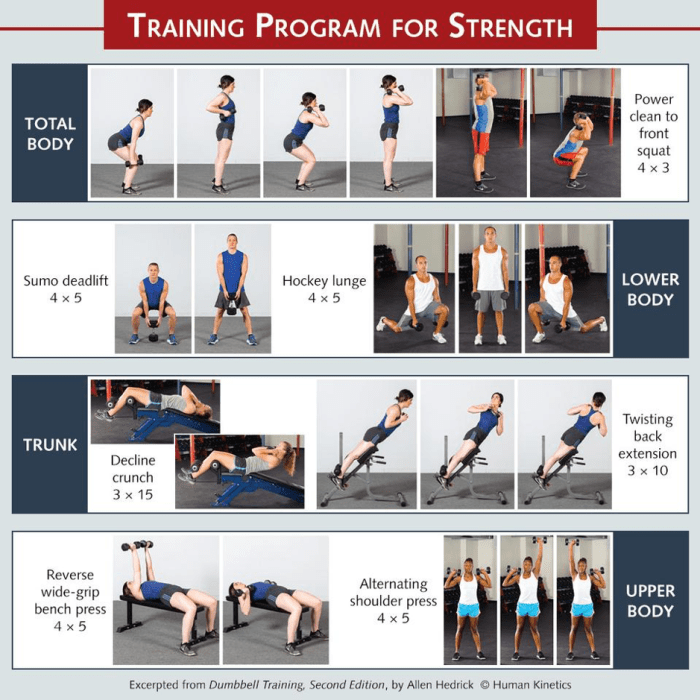Muscular Strength Training Program: Building strength isn’t just about lifting heavier weights; it’s a holistic journey encompassing meticulous program design, precise technique, and strategic recovery. This guide delves into the science behind muscle growth, offering a structured approach to crafting personalized strength-training regimens, covering everything from beginner routines to advanced strategies for maximizing gains. We’ll explore the crucial elements of proper form, progressive overload, and nutritional support to help you achieve your fitness goals safely and effectively.
From understanding the physiological mechanisms of muscle hypertrophy to mastering fundamental exercises like squats and deadlifts, this guide provides a roadmap for building a robust and resilient physique. We’ll also address common misconceptions and debunk prevalent myths, empowering you to make informed decisions about your training. Whether you’re a seasoned athlete or a complete beginner, this comprehensive resource will equip you with the knowledge and tools necessary to embark on a successful strength-training journey.
Defining Muscular Strength Training: Muscular Strength Training Program

Muscular strength training, also known as resistance training, involves performing exercises that challenge the musculoskeletal system, leading to increases in muscle size (hypertrophy) and strength. This process is fundamental for improving physical performance, maintaining functional independence, and enhancing overall health and well-being. The gains in strength are not solely dependent on increased muscle mass; neurological adaptations also play a crucial role.
Physiological Mechanisms of Muscular Strength Gains
Strength gains result from a complex interplay of physiological adaptations. Muscle hypertrophy, the increase in muscle fiber size, is a key component. This occurs through the synthesis of new muscle proteins, exceeding the rate of protein breakdown. Concurrent with hypertrophy, neural adaptations contribute significantly to strength improvements. These include increased motor unit recruitment (activating more muscle fibers simultaneously), improved synchronization of motor unit firing (more coordinated muscle contractions), and enhanced neuromuscular efficiency (better communication between the nervous system and muscles).
These adaptations are driven by progressive overload, a principle that necessitates consistently challenging the muscles with increasingly heavier weights or more demanding repetitions over time.
Types of Muscle Contractions in Strength Training, Muscular Strength Training Program
Strength training utilizes various types of muscle contractions. Isometric contractions involve muscle activation without changes in muscle length, like holding a plank. Concentric contractions occur when the muscle shortens, as in the upward phase of a bicep curl. Eccentric contractions involve muscle lengthening under tension, such as the lowering phase of a bicep curl. Eccentric contractions are particularly important for strength gains, often leading to greater muscle damage and subsequent hypertrophy.
Isotonic contractions, commonly used in strength training, involve constant muscle tension throughout the movement, though muscle length changes. Plyometric exercises, such as box jumps, utilize rapid eccentric loading followed by explosive concentric contraction, enhancing power and strength.
Examples of Strength Training Exercises
A well-rounded strength training program targets multiple muscle groups. The following table provides examples of exercises categorized by muscle group, equipment needed, and sets and repetitions (S&R) recommendations. Note that S&R should be adjusted based on individual fitness levels and training goals. A qualified fitness professional can provide personalized guidance.
| Exercise | Muscle Group Targeted | Equipment Needed | S&R |
|---|---|---|---|
| Barbell Bench Press | Chest, Shoulders, Triceps | Barbell, Weight Plates | 3 sets of 8-12 repetitions |
| Squats | Quads, Glutes, Hamstrings | Barbell (optional), Weight Plates (optional) | 3 sets of 8-12 repetitions |
| Deadlifts | Full Body (Back, Legs, Core) | Barbell, Weight Plates | 1-3 sets of 1-5 repetitions |
| Overhead Press | Shoulders, Triceps | Barbell, Dumbbells, Weight Plates | 3 sets of 8-12 repetitions |
| Pull-ups | Back, Biceps | Pull-up Bar | 3 sets to failure (or as many repetitions as possible) |
| Rows | Back, Biceps | Barbell, Dumbbells, Cable Machine | 3 sets of 8-12 repetitions |
| Leg Press | Quads, Glutes, Hamstrings | Leg Press Machine | 3 sets of 10-15 repetitions |
| Bicep Curls | Biceps | Dumbbells, Barbell | 3 sets of 10-15 repetitions |
| Triceps Extensions | Triceps | Dumbbells, Cable Machine | 3 sets of 10-15 repetitions |
Nutrition and Recovery for Strength Gains

Maximizing muscular strength gains requires a strategic approach that extends beyond the gym. A well-structured nutrition plan and a commitment to adequate recovery are critical components for optimizing results and preventing injury. Ignoring these elements can significantly hinder progress, even with the most rigorous training regime.Adequate nutrition fuels muscle growth and repair, while sufficient rest allows the body to rebuild and adapt.
This section details the importance of protein intake, provides examples of a balanced diet, and Artikels strategies for optimizing sleep and recovery.
Protein Intake for Muscle Growth and Repair
Protein is the fundamental building block of muscle tissue. Following resistance training, muscle fibers experience microscopic tears. Protein, specifically its constituent amino acids, is essential for repairing this damage and stimulating the growth of new muscle protein. A deficiency in protein intake can severely limit muscle growth and recovery, leading to plateaus or even regression in strength gains.
The recommended daily protein intake for individuals engaged in intense strength training ranges from 1.6 to 2.2 grams per kilogram of body weight, although individual needs may vary based on factors like training intensity, genetics, and overall caloric intake. For example, a 70kg individual should aim for 112-154 grams of protein daily.
Examples of a Balanced Diet Supporting Muscular Strength Training
A balanced diet supporting muscular strength training should prioritize lean protein sources, complex carbohydrates, and healthy fats. This ensures the body has the necessary building blocks for muscle repair and the energy to fuel intense workouts. A sample daily meal plan might include:* Breakfast: Oatmeal with berries and a scoop of whey protein powder, along with a handful of almonds.
This provides complex carbohydrates for sustained energy, protein for muscle repair, and healthy fats for hormone production.
Lunch
Grilled chicken salad with mixed greens, quinoa, and avocado. This offers lean protein, fiber-rich carbohydrates, and healthy fats.
Dinner
Baked salmon with roasted vegetables and brown rice. Salmon provides high-quality protein and omega-3 fatty acids, while the vegetables offer vitamins and minerals. Brown rice provides complex carbohydrates.
Snacks
Greek yogurt with fruit, protein shake, or a handful of trail mix. These provide convenient sources of protein and carbohydrates throughout the day.It is important to note that this is just a sample plan, and individual needs will vary depending on factors such as body weight, activity level, and metabolic rate. Consulting with a registered dietitian or sports nutritionist can help personalize a diet plan that aligns with individual goals and preferences.
Optimizing Sleep and Recovery to Enhance Strength Gains
Sleep is crucial for muscle protein synthesis and overall recovery. During sleep, the body releases growth hormone, a vital hormone for muscle growth and repair. Insufficient sleep can impair hormone production, reduce muscle protein synthesis, and increase the risk of injury. Aim for 7-9 hours of quality sleep per night to optimize recovery and maximize strength gains.
Strategies to improve sleep quality include establishing a regular sleep schedule, creating a relaxing bedtime routine, ensuring a dark and quiet sleep environment, and avoiding caffeine and alcohol before bed. Consistent and adequate sleep is as important to strength gains as the training itself; it is a non-negotiable element of a successful program.
Ultimately, a successful Muscular Strength Training Program is a personalized journey that requires commitment, consistency, and a keen understanding of your body’s response. By mastering proper technique, embracing progressive overload, and prioritizing recovery, you can unlock your full strength potential and achieve sustainable, long-term results. Remember that consistency and mindful adjustments are key to avoiding plateaus and maximizing your gains.
This guide provides the framework; your dedication will determine the outcome. Start building a stronger, healthier you today.

